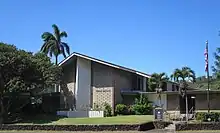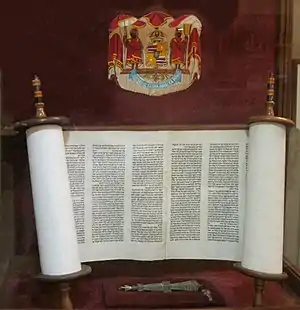Temple Emanu-El (Honolulu)
Temple Emanu-El is a Reform Jewish congregation in Honolulu that was established in 1938, and joined the Union for Reform Judaism in 1952. The synagogue building at 2550 Pali Highway21°19′50″N 157°50′40″W was consecrated in 1960 under the spiritual leadership of Rabbi Roy A. Rosenberg. The architect was Edward Sullam, and the builder was T. Takahashi.[1] The sanctuary is decorated with 12 8-foot paintings by the New Mexico-based artist Alice Flitter.[2]
| Temple Emanu-El | |
|---|---|
 Temple Emanu-El, Honolulu, Hawaii | |
| Religion | |
| Affiliation | Reform Judaism |
| Leadership | Rabbi-Cantor Cheri Weiss |
| Year consecrated | 1960 |
| Location | |
| Location | 2550 Pali Highway, Honolulu, Hawaii |
| Architecture | |
| Architect(s) | Edward Sullam |
| Date established | 1938 |
| Website | |
| www | |
Educational Programs
In addition to providing religious services on Shabbat and on holidays, Temple Emanu-El offers various educational programs for children and adults. The School of Jewish Studies (SJS) provides Jewish religious and cultural education for students in preschool through about 7th grade. Students typically graduate from SJS by having their b’nai mitzvah, after which several youth group experiences become available through 12th grade.[3] Temple Emanu-El also offers a Torah Study program for adults.
The Kalakaua Torah and yad

Elias Abraham Rosenberg came to Hawaii from San Francisco in 1886. Accounts vary as to whether or not he ever used the title “Rabbi”, but he was never ordained.[4] He developed a friendship with King David Kalākaua, telling him stories from the Torah and teaching him the Hebrew language. In 1887, Rosenberg returned to San Francisco because of political unrest surrounding the Bayonet Constitution in Hawaii. He left his Torah and yad (Torah pointer) with Kalākaua for safe-keeping.[5]
The Torah and yad remained in the royal family. The House of Kawānanakoa would lend the scroll to the Honolulu Jewish community for High Holy Day services[5] until 1925 and possibly through the 1930s[6] or into the 1940s.[5] The yad eventually belonged to Kekaulike Kawānanakoa, granddaughter of Princess Abigail Kawānanakoa; Kekaulike gifted it to a friend who gave it to Temple Emanu-El in 1959.[6]
After the death of Princess Abigail Kawānanakoa in 1945, the Torah was given to Flora Kaai Hayes for safekeeping. Following her death in 1968, she left it to her son, Homer A. Hayes. The location of the Torah had remained publicly unknown for 13 years after the donation of the yad, but was discovered in 1972 when Homer told Temple Emanu-El member Samuel Landau about the scroll. The Torah eventually passed into the Temple's ownership along with the yad.[6] The Torah and yad are permanently displayed in the main sanctuary.[5]
Footnotes
- Plaque near main entrance of temple
- Beigel, Greta, "Special paintings by artist Alice Flitter honor the 60th anniversary of Temple Emanu-El's sanctuary", Honolulu Star Advertiser, March 15, 2020, pp. D1 & D6.
- "SJS - Temple Emanu-El". Shaloha.com. Retrieved 24 June 2020.
- Adler, Jacob, "Elias Abraham Rosenberg, King Kalakaua's Soothsayer", Journal of Hawaiian History, 1970, Vol. 4, p 56
- Tigay, Alan M., “The Jewish Traveler: Honolulu”, Hadassah Magazine, Vol. 90, No. 5, January 2009, 28.
- "Jewish scroll is traced to former owner, King Kalakaua". The Honolulu Advertiser. July 13, 1973. p. 26. Retrieved June 2, 2021.
References
- Adler, Jacob, "Elias Abraham Rosenberg, King Kalakaua's Soothsayer", Journal of Hawaiian History, 1970, Vol. 4, pp 53–58.
- "The King's Torah", Hana Hou, August/September 2017